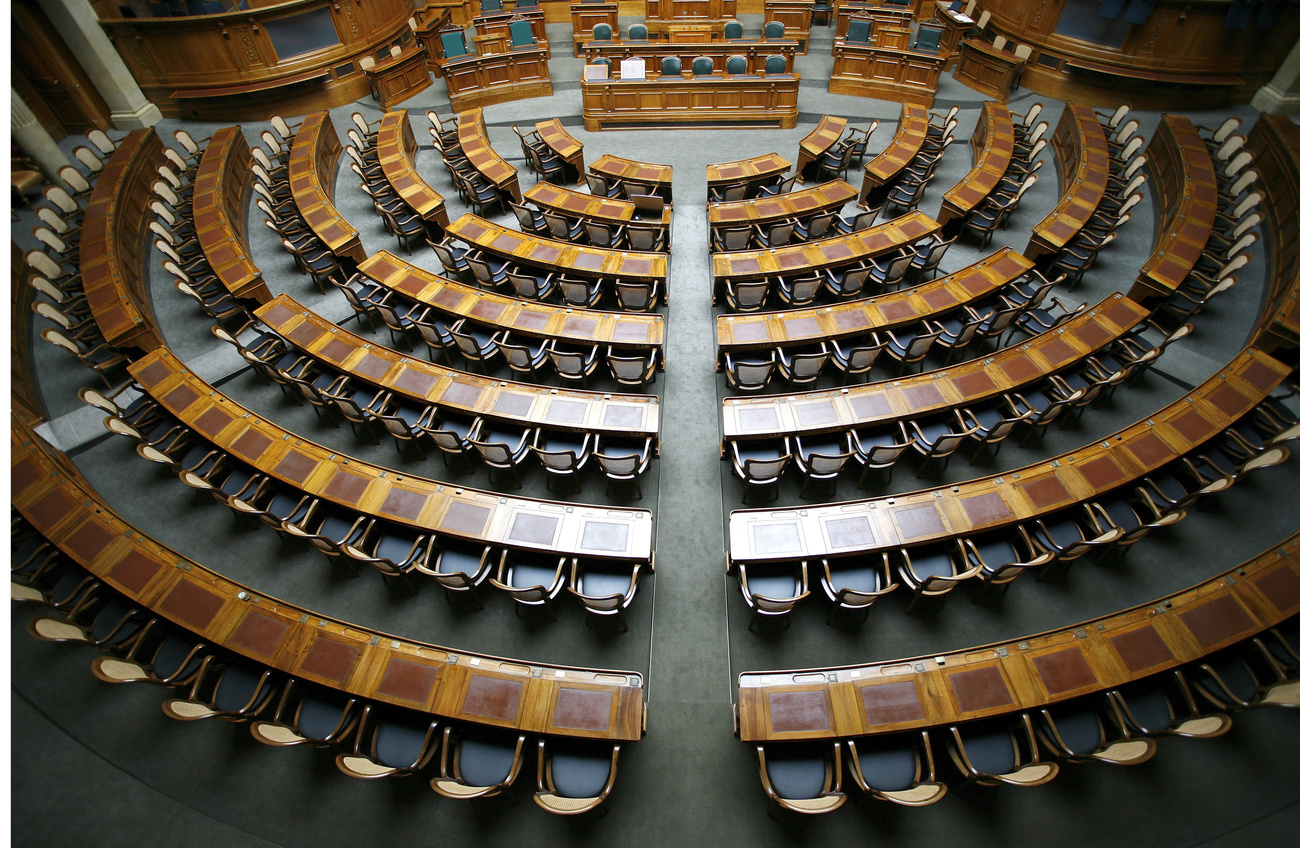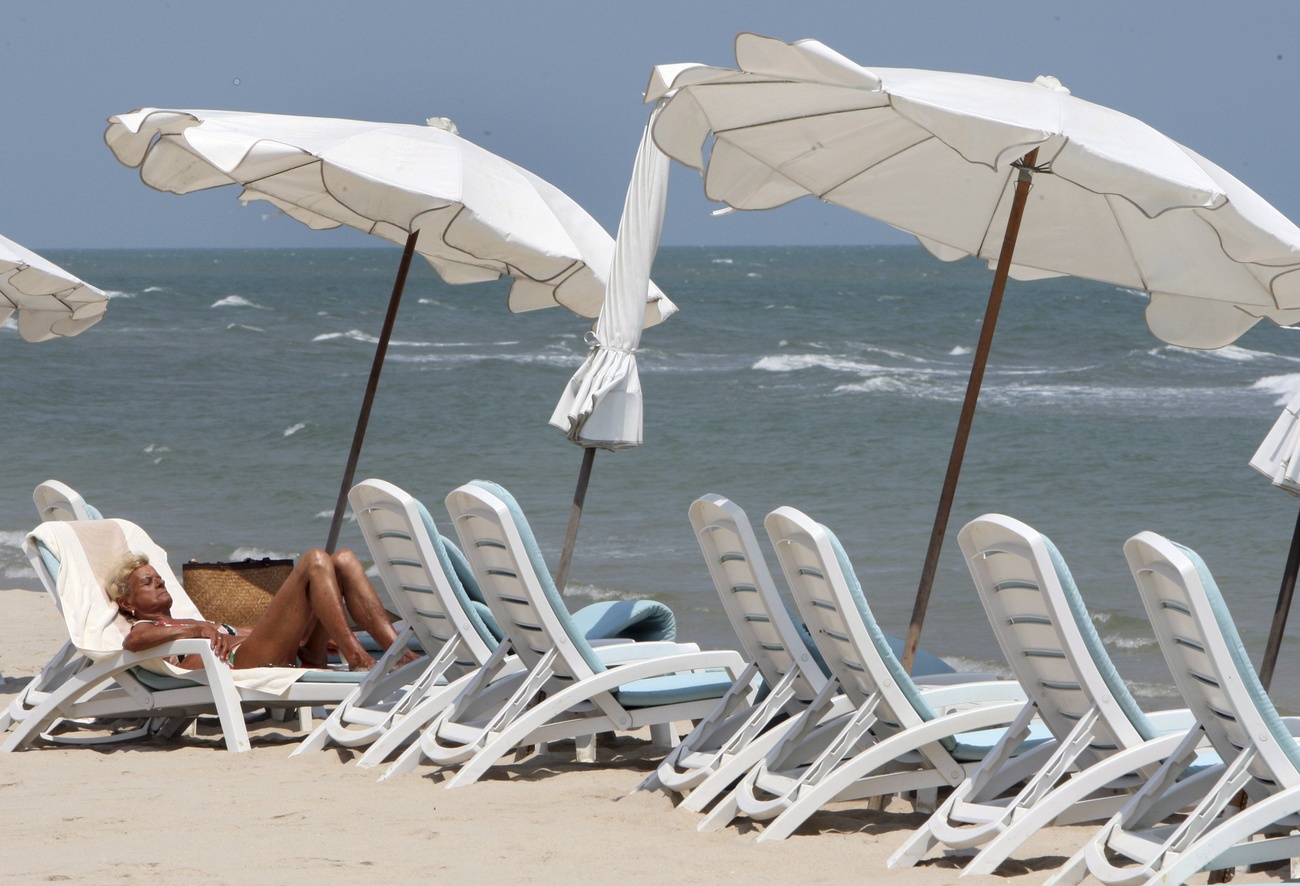Swiss parliament predicted to lurch to the right

A more right-wing parliament – the result of the rise of conservatives and the decline of environmentalists – is likely to emerge from the ballot boxes in federal elections on October 22.
The green wave seems to have subsided, according to the penultimate election poll by the Swiss Broadcasting Corporation (SBC), carried out by the Sotomo research institute and published on Wednesday.
The Green Party is now 2.5 percentage points down on the previous federal election in 2019. Until now, the Liberal Green Party had held its own and managed to offset some of these losses. This is no longer the case: for the first time the party has lost ground (-0.5 percentage points).
The penultimate electoral barometer ahead of parliamentary elections on October 22 was carried out by the Sotomo research institute on behalf of the Swiss Broadcasting Corporation (SBC), SWI swissinfo.ch’s parent company.
The data was collected between August 4 and 25. A total of 40,889 voters took part in the survey, both on the SBC online portals and on the Sotomo research institute website. The margin of error is +/- 1.2 percentage points.
Since survey participants are self-recruited (opt-in), the composition of the sample is not necessarily representative of the population. For example, men generally participate more than women in political surveys. Distortions in the sample are corrected by statistical weighting procedures.
“In 2019, the Liberal Greens benefited from the progressive spirit that prevailed. The climate is now more favourable to the conservatives,” said Sotomo political scientist Michael Hermann.
At the other end of the spectrum, the right-wing Swiss People’s Party is looking more and more like the winner on October 22, with a gain of two percentage points. As a result, Switzerland’s largest party could win 27.6% of the vote, its third-highest tally.
Historic neck-and-neck race
The centre-right Radical-Liberal Party sees its position as the country’s third political force seriously threatened. Predicted to win 14.6% of the vote, it could be overtaken by The Centre (14.8%) for the first time. The Centre is the result of a merger in 2021 between the Christian Democratic Party and the Conservative Democratic Party.
However, the political scientists at Sotomo say it is impossible to predict which of the two parties will end up in third place, as the difference between them is smaller than the poll’s margin of error. But if The Centre were to overtake the Radical-Liberals, it would represent a historic shift in political power: ever since 1848, when the modern Swiss federal state began, the Radicals-Liberals have always been ahead of The Centre’s predecessors.
This neck-and-neck race is also decisive for the composition of the Federal Council, Switzerland’s seven-person government, since the principle of concordance stipulates that the three largest parties get two seats in government and the fourth party only one. If The Centre becomes the country’s third-largest party, it could claim a second seat in government.
‘Clear correction’
On the left, the Red-Green camp once again lost two percentage points, as it did in the previous electoral barometer. As for the parties on the right, they are now up by 1.5 points, slightly more than two months ago.
“This result signifies a clear correction towards the right in relation to the 2019 elections,” Sotomo’s political scientists wrote. They note that the results of the electoral barometer correspond to the political orientation of the House of Representatives after the 2011 federal elections, which were won by the Swiss People’s Party.
The analysts point out that the electoral barometer reflects voting intention only for the 200-seat House of Representatives. The 46-seat Senate, which is elected by majority vote in most cantons, is also important in determining the political direction of parliament.
Climate no longer main concern
Climate change has slipped down voters’ list of concerns. It is now in second place, behind rising health insurance premiums. Immigration, on the other hand, has gained in importance: it is now the third most important political challenge for respondents.
Global warming is slowly but steadily losing importance, according to the authors of the barometer. “However, the electorate still regards it as central when it comes to deciding which party to vote for,” Hermann added. Some 25% of those questioned said they had decided for a party on the basis of this issue, compared with 21% because of the rise in health insurance premiums.
The order of concerns is different for the Swiss Abroad, who see immigration as the main political challenge facing Switzerland, followed by climate change and then health insurance premiums.
As expatriates are not affiliated to a health insurance scheme in Switzerland, it is logical that this issue is less important to them than it is to the Swiss who live in Switzerland. Unsurprisingly, the barometer notes that “the Swiss Abroad attach greater importance to issues concerning relations with foreign countries, such as immigration, good relations with the European Union, independence and sovereignty”.
Credit Suisse continues to vex the Swiss
The main sources of irritation for the Swiss have changed little since the previous election barometer. The mismanagement of Credit Suisse, which was taken over by its rival UBS, and the excessive bonuses awarded to its executives are still in first place. “That hasn’t changed, even though UBS has waived the government’s guarantees,” Hermann said.
Climate activists who glue their hands to roads and debates about so-called wokism (an awareness of and sensitivity to social injustice) are the other two subjects that most annoy the Swiss. This could benefit the People’s Party, which has turned them into campaign themes.
Edited by Samuel Jaberg. Translated from French by Thomas Stephens

More
The Swiss parliament for beginners

In compliance with the JTI standards
More: SWI swissinfo.ch certified by the Journalism Trust Initiative












You can find an overview of ongoing debates with our journalists here . Please join us!
If you want to start a conversation about a topic raised in this article or want to report factual errors, email us at english@swissinfo.ch.